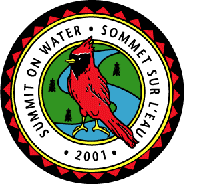Launched in 2001
This is where we share our ideas, help develop new ones, and draft an action plan and set of guiding principles–for water and for meaningful, participatory and sustainable life for all peoples.
The work on a water manifesto culminated in the Summit on Water, held on Wahta Mohawk Territory, Bala, Ontario. The event brought together academics, indigenous representatives, Members of Parliament, constitutional experts and water technologists. The Summit on Water was filmed in its entirety and broadcast multiple times on CPAC (Canadian Public Affairs Channel).
A Water Manifesto
This is where, together, all of us work towards producing A Water Manifesto for the World.
Sounds like a lofty goal? Not really. Much work has already been done by various international groups towards developing something that would protect our fresh water systems throughout the planet, and, in so doing, help protect us–the people who rely upon this vital resource.
Here we bring together the people, the ideas and the vision already developed. But here, you help coordinate the pieces and help develop the plan. This section of our website is like a tributary within your web portal to the key public policy issues of today and tomorrow.
What is water?
Fresh water is something we need for food and human sustenance.
Water is something we use for washing and bathing. Water is a source of recreation.
Water is key to religious and spiritual ceremonies. Water is a commodity. Water is the most abundant substance on Earth and even in our bodies. Fresh water is freedom.
All humanity has a duty to integrate environmental conservation with development activity at all stages and all levels so as to achieve sustainable development.
We must also be vigilant towards keeping human resource use and related activity within the limits of the carrying capacity of supporting ecosystems.
Governments, businesses and other organizations should cooperate in promoting the development and adoption of environmentally sound technologies for the clean-up, restoration, management, maintenance and protection of our fresh and natural water resources.
With these thoughts in mind, we are holding a series of Summit Meetings on the Preservation of Fresh Water. The first hosting site was the Wahta Community Centre at Bala Ontario, for an event which took place July 25-26.
Summit on Water
July 25, 2001
Wahta Mohawk Territory, Bala, Ontario
Agenda
Welcome Message from Chief Blaine Commandant, Wahta Mohawk First Nation
8:45 Opening Prayer from Wahta Mohawk Elder, Grace Franks
9:00 Welcome & Introductions:
Dennis Mills, Member of Parliament (Toronto-Danforth)
Andy Mitchell, Member of Parliament (Parry Sound Muskoka)
John Herron, Member of Parliament (Fundy Royal) Progressive Conservative
Party Environment Critic
9:30 The Importance of Water to First Nations and Women’s Roles:
Judy Da Silva, Grassy Narrows First Nation
10:00 Recommendations on First Nations Water Security
First Nations and Water Quality Standards:
Ovide Mercredi, Political Adviser, Assembly of First Nations
- Maintaining Water Quality on Reserves:
- Chief Neeapatung, Yellowquill First Nation
- Toward a Common Strategy on First Nations Drinking Water Quality:
- F. Henry Lickers, Mohawk Council of Akwesasne
- Freshwater Sources and First Nations Water Quality:
- Chief Strikes with a Gun, Peigan First Nation
11:30 The Cumulative Effects of Global Warming and Human Effluents on the
Security of our Water:
Dr. David Schindler, Killam Memorial Professor of Ecology, University of Alberta
12:30 Working Lunch
1:30 Panel on Canada’s New Water Technologies
- Using Canada’s Research Products:
- Graham Best, Zenon Environmental Inc.
- Access to New Technologies in Canada:
- Dr. Hans Peterson, Principal Research Scientist, Safe Drinking Water Foundation
2:45 Panel on Canadian-International Considerations
- Panel
Chair & Co-Chair for Canada/United States Interparliamentary Group:
- Joe
Commuzi, Member of Parliament (Thunder Bay-Superior North)
- Water
and Canada’s International Agreements:
- Barry
Appleton, LLB, LLM, Appleton & Associates
- First
Nations & Economic Inclusion:
- Dan
Villeneuve, CEO, Iroquois Water
- The
U.S. Model and First Nations Water Quality:
- Jeff
Besougloff, American Indian Environmental Office, Office of Water, U.S.
Environmental Protection Agency
5:00 Summary of Findings and Overview for Thursday
Thursday, July 26
9:00 Agenda and Recap from Day One:
Dennis Mills, Member of Parliament (Toronto-Danforth)
9:15 International Work on Water Quality:
Dr. Ralph Daley, Director, United Nations University’s International Network on Water, Environment and Health, Hamilton, Ontario
9:45 Panel on Protecting First Nations Drinking Water Sources
- Infrastructure & Wastewater Treatment:
- Bill Marion, First Nations Water and Wastewater Association
- Runoff Mitigation: Eva Johnson, Kahnawake Environment
- Is the Same Protection Offered by Winter’s Doctrine and the Fisheries Act?: F. Henry Lickers, Mohawk Council of Akwesasne
- Impact on Biota and the Great Lakes Water Quality Agreement:
- F. Henry Lickers, Mohawk Council of Akwesasne
10:30 Senate Bill on Water Quality:
Senator Jerry Grafstein (Metro Toronto)
11:05 Translating Advice into Action: Next Steps:
Dennis Mills, Member of Parliament (Toronto-Danforth)
11:55 Closing Prayer
– Grace Franks, Elder, Wahta Mohawk First Nation
